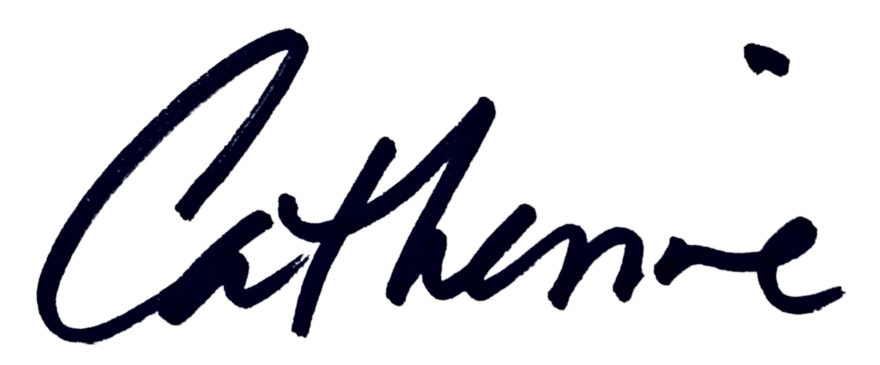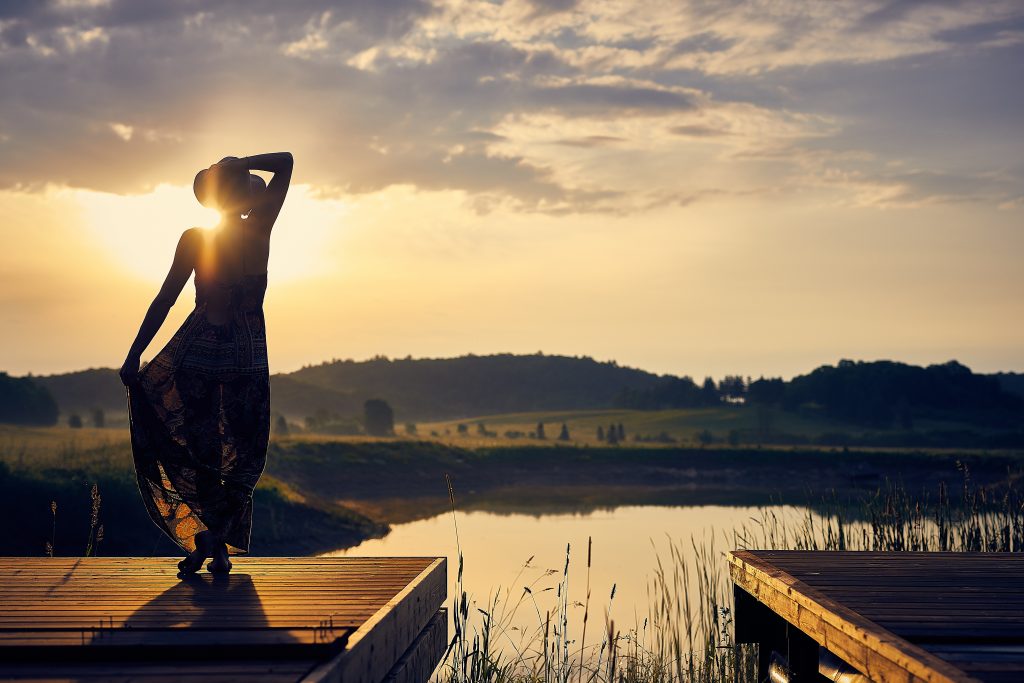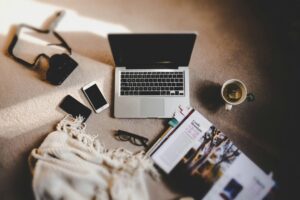Today marks my 100th day of clarity. For me, that has meant no alcohol at all, and almost-daily meditation.
It all started the day Mother Earth literally smacked me upside the head.
I had, by aspirational design, created the opportunity to spend a few days a week working at the cottage for six or seven hours and, should the conditions be attractive, spend a couple of hours skiing.
On the last day of the first week of this new paradigm, I got up early and immediately headed to the hill. I did five or six really terrific runs. Skiing often makes me feel strong and capable, and even though I had a mild hangover, and was getting grumpy with myself for not being more prepared for the cold, windy conditions, I was feeling happy and free.
Before heading back to the cottage, I thought “just one more run.” It was 10:15 am.
As I exited the chairlift, and turned down a narrow path to get to my favorite run, something went wrong and I got distracted—my ski tips crossed and I slammed my body, including my head, sideways onto the hard, ice-packed ground.
Thank goodness I had a helmet on—because I immediately knew I had concussed myself, and it could have been much worse. Three things likely contributed to my distraction: physical discomfort (not being prepared for the weather conditions), an errant snowboarder, and a mild hangover.
Unfortunately, I recognized the symptoms from two previous concussions I’d had over the past six years. Even worse, there is a cumulative negative effect to concussions. I recognized the extent of my injury almost immediately.
Long story short, I eventually got home safely, and, indeed had a concussion.
In order to heal the injury, I spent the next three weeks being quiet and contemplative. I chose to use the recovery time to reconnect to how I really wanted to live, and what specifically I needed to add or subtract to my life to be in alignment. For me, that meant subtracting alcohol, and adding a meditation practice.
I had been thinking about quitting drinking for a few years. It’s hard to ignore the emerging and robust scientific evidence about the detrimental health effects of alcohol (even my coveted, high-end wines), regardless of the amount consumed. As a middle-aged woman, the data is pretty clear—it’s not good for me. I’ve always been quite health-conscious, and it started to become clear that regular drinking was an antithetical practice that I had deeply embedded into my daily life. I had also begun to notice how insidiously alcohol is woven into our lives—socially, culturally, commercially—and that I was starting to feel controlled by it.
I had created a bad habit with an addictive substance—I wasn’t really drinking to intentionally get drunk—although I had certainly had come to look forward to ‘taking the edge off’ when life got a little stressful. And there always seemed to be a reason to imbibe—the end of a long day, a string of stressful business meetings, a great meal shared with friends that would pair nicely with a high-end glass of red wine, general life celebrations and stressors. Booze is everywhere and it’s so easy to make mindless choices.
Also, I’d begun to notice clearly and regularly that I was operating at a suboptimal level—professionally, creatively, personally, everything. Alcohol was disrupting my ability to have restorative sleep, and I would often wake up with a mild hangover, and, later, feel the overwhelming need to nap. I also noticed that I did not have the creative clarity at work—to tackle diverse activities throughout the day (and evening)—that I hit a wall at some point. I was also more anxious and reactive than I aspire to be—I didn’t have the reserves to handle additional stressors that always seemed to pop up. Giving up alcohol was an important first step for me on my journey.
How could I commit to returning to a clearer and more present experience of life?

Having a concussion forced me to be quiet and alone for a few weeks, and triggered a rekindled interest in meditation. Meditation has popped in and out of my life over the past 30 years, and in wanting the brain healing, clarity, concentration, and stress management that it could bring, seemed a common-sense choice to re-introduce to my bucket of healthy habits. Neuroscientific evidence has been particularly vigorous over the past few years in terms of the true physiologic, psychological, and emotional impact that meditation has on the human brain and body. I had nothing to lose.
For the past year or so, I’ve been a regular listener of the 10% Happier Podcast with Dan Harris, where, although the focus is on meditation, the content of the conversations is vast and varied. Harris chats with guests from all walks of life with various peripheral interests, professional expertise, spiritual disciplines, and life stories.
In the fall of 2018, there was an episode featuring Jeff Warren, who I learned was based in Toronto. Warren has a real, simple way of contextualizing meditation practice that resonated with me, and was aligned with my personal and professional philosophy to “connect, create, communicate.” Warren was all about keeping it simple, and noticing the whole human, with all our messy, kooky idiosyncrasies.
It took only a few minutes for me to find a session with Warren in April 2019. I booked it on the spot, and last month, I attended that “How to Guide Meditation” workshop—a 2.5-day retreat which kicked off my renewed commitment to meditation. The focus was clarity, concentration and equanimity. I am so excited to begin integrating these elements into my personal and professional activities.
So, how might you begin to integrate a bit more clarity and balance in your life?
On a recent episode of the 10% Happier Podcast (yes, I love this show), Harris shared a list of questions his meditation teacher, Joseph Goldstein, offered as a way to determine if you are moving forward in your practice, whether on the way to enlightenment (capital ‘E’), or just getting a little bit better every day (a more realistic goal). These are great questions to ask yourself even if you don’t meditate, and just want a clearer, calmer, more connected sense of balance in your life. You may even want to turn them into a scaling rating to measure progress over time.
Questions to ask yourself:
- Are you less immediately reactive to difficult or stressful situations both in meditation and in life?
- Over time, are you generally becoming aware of the wandering mind more quickly?
- In daily life, the feeling of rushing is good feedback that we are ahead of ourselves, not being settled back in our bodies. Do you find that you’re rushing less often or becoming aware of it more quickly?
- Is there more awareness with your speech, perhaps refraining a little more frequently from angry or judgmental speech?
- Is there a little more openness in being with other people and a greater willingness to listen?
- Are you becoming a little more familiar with the qualities of calm and concentration in your practice?
- Are you using the tool of mental-noting? Is it becoming a little more continuous, at least for periods of time. Is the tone of the note becoming softer?
- Is there a little more ease with being with whatever arises in your meditation practice, simply noting it for what it is?
- Is it a little easier to sit longer?
- Are you becoming somewhat more aware of the changing nature of all experience and holding on to things a little less?
There were a few items that really stood out for me—especially as I mark this 100th day of clarity. In answering the questions, I pondered—am I clearer and calmer from no alcohol, or is it the meditation? The answer is a muddy, but resounding yes.
Improving in these areas has likely been the result of a symbiotic/synergistic outcome I created from a bunch of rekindled practices and thoughtful choices—booze-free, going to bed early, employing the basics of good food and moderate exercise, and adding just 10 minutes of almost-daily meditation. As a result, I am clearer, calmer, and more myself.
Here’s to another 100 days. And let’s hope that it doesn’t take another smack on the head to remember how important it is for me to live my values every day—to connect, create, and communicate—with clarity and calm.
If you are interested in having a conversation about any of these experiences (concussions, alcohol-free, meditation) please drop me a line!



